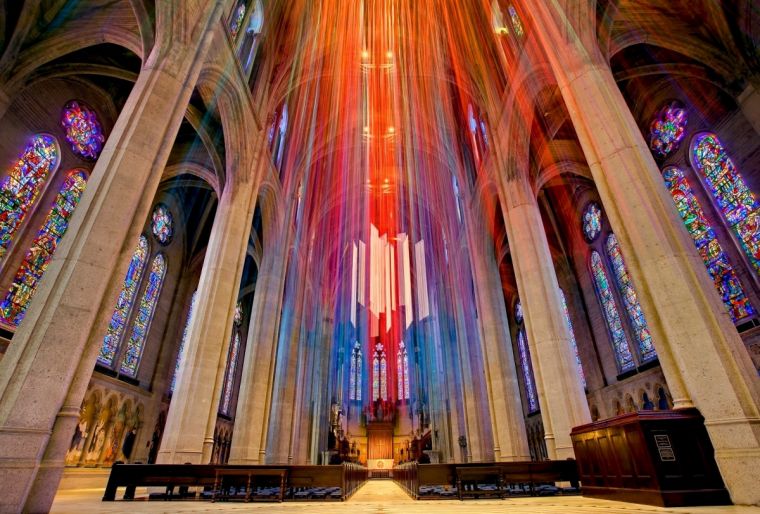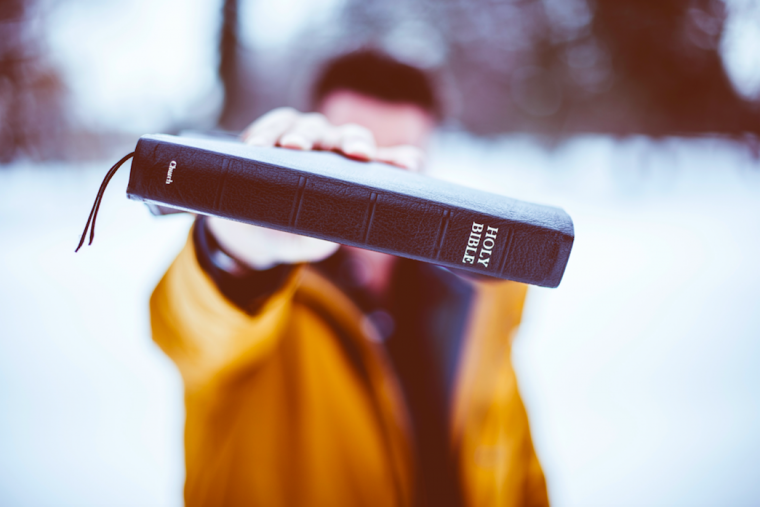Church Clarity wants answers on homosexuality – but what if ambiguity's what we need?
'Church Clarity' is a divisive new database that's pressuring pastors to clearly declare their stance on homosexuality. Some are celebrating, others fear what's next. Christians should love the truth, but in an ever-polarised world - can't we learn from ambiguity too?
US evangelicals could be at war once again. Well, maybe the war never really stopped, with several recent controversies stoking ecumenical fire – be it the ongoing, fierce division over allegiance to Donald Trump, the fallout after evangelical Eugene Peterson's endorsement of gay marriage (and his subsequent backpedalling) or the rallying cry of the Nashville Statement – a highly conservative document that enshrined a 'Christian' stance on sexuality that even some traditionalists thought was too strong – and excessively divisive.

This week has brought with it a new controversy by the name of Church Clarity: an online database that 'scores' (mainly) US churches according to whether they are 'affirming' or 'non-affirming' of LGBTQ persons, and how clearly they communicate their policy. Its stated aim matches its name: it wants to challenge evasiveness and obscurity on what is to many a central, and personal issue.
As Church Clarity, a group comprised mainly of progressive leaning Christians, says: 'No person should have to wonder the limits of their "welcome."' It's not advocating for policy changes, but rather minimising ambiguity. The more liberally-minded have applauded it, and it's possible that conservatives could praise it too – its emphasis on drawing clear lines in some ways follows the spirit of the Nashville Statement, albeit from the opposite perspective. Vocal conservative and Benedict Option author Rod Dreher has welcomed the 'winnowing' that will come from Church Clarity, since it highlights 'irreconcilable differences' in the Church and though that will be 'sad and painful', it makes clearer what it will take to be a 'faithful Christian in our time'.
Others have warned that it might only further divide an already fractured community over a complex issue, and that its intention of pressurising pastors to define their policy stance could constitute an aggressive form of 'Church control'. Gay, celibate and 'non-affirming' Christian writer David Bennett said the initiative was a 'power grab' that made him feel 'deeply unsafe'.
And the concerns may be well-founded. First, the initiative, intentionally or not, promotes an 'us and them' mentality that can only further provoke present tensions. Everyone knows this is the number one issue for contemporary evangelicals: the most talked about, the most complex and the most emotionally loaded.
Conservatives emphasise 'faithfulness' to God and Scripture: this is a trial for their Christian integrity. Progressives highlight the principles of 'love', 'welcome' and 'inclusion' for the marginalised. Others are torn in the middle. By setting the terms to which other churches must assent ('affirming' or 'non-affirming'), Church Clarity have deliberately created narrow labels for churches to be known by. That's their point of course, but does it run the risk of reducing complex communities to one deeply political definition? No one wants to be known as 'non-affirming' – theologian Preston Sprinkle has said he prefers the more positive phrase 'historically Christian'.
Others warn of a deeper danger ahead. Conservative scholar Denny Burk, echoed by Dreher, has said that Church Clarity's database is a pretext for removing the tax-exempt status of 'non-affirming' churches, something arguably hinted at on the group's website. Dreher is emphatic that 'data collected will ultimately be used in a federal civil rights lawsuit against dissenting churches. There it is. This was always in the cards. It was never about tolerance, but coercion'.
Without being hysterical, it's not hard to believe that there could be legal implications for groups taking a position increasingly seen as socially intolerant and bigoted. However, the progressive, gay Christian writer Julie Rodgers, an adviser to the group, said on Twitter that she'd 'not heard or read anything along those lines'. Fears of a 'Christian Gestapo' may be premature.
Church Clarity is clearly pasisonate about the 'truth' - but what if ambiguity is underrated?
I'm not for a moment defending an evasiveness that deceives, or pretends it doesn't believe what it does. Clearly, pastors should be as honest and truthful as they can be to those they are called to serve. But, is a nationwide (and beyond, the group has suggested) database the best pastoral solution to a complex and personal problem? This is still for many churches and leaders a new and confusing conversation. People need to be loved, but deep church community goes far beyond a policy position.

Consider for example the issue of women in leadership, another classic contention amongst evangelicals. I personally support women at all levels of church leadership, though I've spent years at a church that quietly didn't. I took a different stance on one issue, but there was a bigger picture – and the church didn't take a hard line on its position.
'WOMEN STAY SILENT' wasn't emblazoned on their poster: the leaders were clearly wise, mature and open to some conversation on the complex issue – they hosted diverse perspectives. I care about that issue, but it's not the only thing I care about. In the 500th anniversary of the Reformation, it's worth noting how easy splitting comes to us now, with churches so often convinced that their theology is the correct one – even if the fruit of such thinking is thousands of different denominations.
In light of such widespread disagreement on issues that Scripture addresses, isn't 'we don't know' a generally wiser answer than 'we're clearly right on this'?
This isn't an apologetic for ultra-vague theology or never having a position. But maybe taking a stance, in a culture that's already desperate to label and polarise, is overrated? We're socially geared toward antagonistic misunderstanding – perhaps we shouldn't indulge it.
I don't want just to see a policy position on a website – I'd rather have coffee with my pastor and talk about 'x' issue. Read, listen and reflect. Even if there's an irreconcilable clash, we could still pray, sing and grow together. Church is so much more than a membership club for people who share the same beliefs. A community before God, it should also be a haven of humility – and a witness to a transforming love that brings enemies together.
I realise that I can't claim to know the personal pain of going to a church where your lifestyle, your identity, is seen as a 'problem' to solve or just an 'issue' to avoid. Clearly a kind of 'ambiguity' can be damaging and wrong in that context, but again that's surely best resolved in a pastoral, relation context – not through a digital catalogue.
Christians, as human beings, don't always get along. It's painful but inescapably, and perhaps increasingly, true. And yet we're still called to be 'ministers of reconciliation', embodying grace, truth and the love of Christ to each other and the world. I welcome the pastoral, truth-seeking intentions of Church Clarity. However, my heart says that a database (never the best way to get to know anyone) could only exacerbate persisting pain and division.
What comes next remains to be seen. The future is uncertain. Can't we be a little uncertain too?
You can follow @JosephHartropp on Twitter











